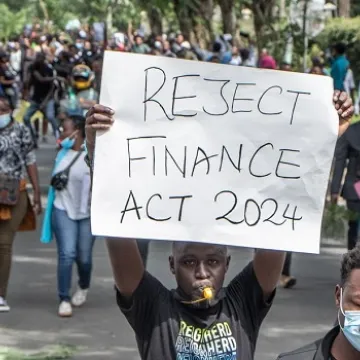Private sector activity eases in August after July’s protest hit

Stanbic Bank's Purchasing Managers Index (PMI) increased to 49.4 in August, from a 12-month low of 46.8, which reported a month earlier when the country was hit by a double whammy of protest anniversaries — June 25th and saba saba (7th July) — causing deaths, shutdown and destruction of businesses, and unmitigated chaos. (Photo/The Star)
Companies in Kenya's private sector experienced a mild decrease in new orders in August, reflecting weakened purchasing power for the fourth month in a row albeit a slight improvement from the slump suffered in July following economic fallout triggered by protests.
According to Stanbic Bank's Purchasing Managers Index, PMI increased to 49.4 in August, from a 12-month low of 46.8, which reported a month earlier when the country was hit by a double whammy of protest anniversaries — June 25th and saba saba (7th July) — causing deaths, shutdown and destruction of businesses, and unmitigated chaos.
The monthly survey gathered sentiments from about 400 purchasing managers spread across companies in Kenya’s agriculture, mining, manufacturing, construction, wholesale, retail and services sectors.
PMI readings above 50.0 show that there was an improvement in business conditions on the previous month while figures less than 50.0 point to a reversal in economic gains.
Employment
"Output declined more than new orders due to weak disposable incomes and challenging economic conditions. Nevertheless, firms, especially in manufacturing, are more upbeat about output over the next 12 months, which should imply healthier business activity in the coming months," explained Christopher Legilisho, Economist at Standard Bank.
He added, "Employment conditions encouraged increased hiring for a seventh month running. However, the decline in backlogs for a third month in a row signals that demand conditions are potentially still weak. Quantities purchased also indicate weakness, although inventories did improve in August."
With demand stabilising, companies in Kenya's private sector expressed a greater level of optimism towards future output for the third consecutive month in August, which took overall sentiment to its highest since February 2023.
At the same time, the survey shows that although the pace of new job openings was mild, the rate of new employment was the fastest experienced in the economy in 15 months.
Consequently, while wage pressures on the employers intensified, the report says purchase prices was less marked than in July. A number of firms commented on higher costs linked to taxes on items such as fuel.
"There was a notable rise in wage costs due to salary adjustments to accommodate cost-of-living pressures, implying that inflation is rising against the backdrop of subdued aggregate demand," stated Christopher.
Nevertheless, as part of efforts to stimulate a recovery in demand, output charges rose only marginally and to the least extent in 12 months.





